Landing on the moon was fake, so climate change is a lie

What do the moon landing and climate change have in common? They’re both fake. Well, at least if you belong to a certain small but very vocal group of people. As a part of this group, you might also be convinced that 9/11 was an inside job, that the CIA killed Martin Luther King and, yes, that radical free market policies will cure all the world’s ills.
Climate change deniers tend to be also conspiracy theorists and hard core free market ideologues, a new study finds. Apparently climate change denial very often goes together with the usual host of other fringe convictions and opinions. The reason for this, the climate science psychologist Adam Corner speculates in the Guardian could be
“…that it is the libertarian instinct to stick two fingers up at the mainstream – whatever the issue – that is important. Because a radical libertarian streak is the hallmark of free-market economics, and because free market views are popular on the political right, this is where climate change scepticism is most likely to be found.”
So what’s the solution? Corner suggests that
“the challenge of engaging with climate change sceptics is finding the lens that better fits their ideological views – not just shouting the science more loudly.”
Or maybe climate change has to be turned into a rogue topic – censored in the news, blasted by scientists, decried by the public – before it gains acceptance – among deniers. But then again, there is no such thing.
Rio plus you
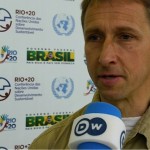
Stefan Rostock, Germanwatch
Author: Kerstin Schnatz
A huge disappointment, a good basis to work from or “a major step forward in achieving a sustainable future” as the United Nations have put it? Depending on who you ask, the outcome of the United Nations Conference on Sustainable Development in Rio de Janeiro in June 2012 is evaluated differently.
In the run-up to the so called Rio+20 Earth Summit, we had asked our Global Ideas crowd to forward their questions to participants of the summit. In Rio, our reporters Philipp and Kerstin asked Stefan Rostock from the non-governmental organisation Germanwatch to answer them. Stefan followed the negotiation process very closely – listen to his answers:
Stefan Rostock Germanwatch by ideasforacoolerworld
About Germanwatch
The non governmental organisation Germanwatch advocates for a more sustainable future in countries of the so-called “South”. It researches and highlights the global consequences that economies and politics of industrialized states have on developing and threshold states – situated mostly in the geographical South of the planet. Germanwatch is based in Bonn and Berlin.
About Rio+20
The United Nations Conference on Sustainable Development took place in June 2012 in Rio de Janeiro, Brazil. With almost 30,000 participants from all around the world including representatives of 191 UN member states as well as 10,000 NGO people and almost 4,000 journalists, it was the biggest conference in the history of the United Nations. Download the 50-page outcome document “The future we want”.
Superhero of bicycles
Author: Kerstin Schnatz
Ever heard of a bike-a-lator? If your answer is “No” we highly recommend you to visit the library of solutions on www.bikestorming.org. Mati Kalwill from Argentina launched the online platform at the Rio+20 summit, the United Nations Conference on Sustainable Development.
“Instead of protesting against people using cars, we celebrate what we stand for. So we take the best of a party and the best of a bike ride to combine it to a bike party.” To support Mati and his team from La Vida en Bici (Life on Bike) one of the hottest clubs in Buenos Aires even put up a VIP bike rack in their entrance hall. Mati loves the fact that “when you come on your bike, you don’t just get into the club more easily, but you also get free and save parking.” Through www.bikestorming.org, he is hoping to share good ideas like these with the world.
Climate Champion
The bike activist’s trip to Brazil was sponsored by the British Council who elected him for their Climate Champion programme. The project supports young people around the globe who tackle global warming.
Climate Champion Mati already accomplished his first mission: The final document of the Earth Summit includes a recommendation to strengthen cycling infrastructure in cities around the world.
How to make UN conferences more bike friendly?
“When I first came to the conference center on my bike, I was surprised there weren’t any bike racks.” Mati admits that even with more bike racks most conference visitors would probably still take a shuttle bus to get to the Summit.
Bike lanes do not exist on the outskirts of Rio where the Earth Summit is taking place making cycling a dangerous sport. “But you need to start somewhere.” Mati smiles knowingly. While he is speaking to us, a new bike rack is set up outside the huge congress center “Riocentro” – thanks to his campaigning.
Mati is dreaming about his next action at the COP 18 Climate talks in oil-rich Qatar this December: “Of course I hope that our goal of 51% of city trips made on bikes rather than cars will be reached before 2030. But if we can make the next big UN conference more bike friendly, this would already be a big step into the right direction.” For his trip to Qatar, he hopes for the support of the British Council’s Climate Champion programme once again.
Mati’s new online platform is a wiki where everyone can post good ideas on how to get more people to ride a bike rather than driving cars: ww.bikestorming.org. If you have a great project for a greener world yourself check out the British Council’s Climate Champion programme.
Minister receives green bracelet
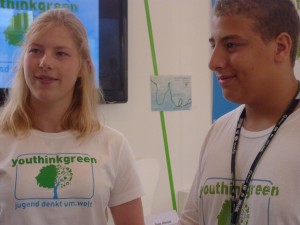
Ahmed together with one of his fellow climate ambassadors from Youthinkgreen.
Author: Kerstin Schnatz
Ahmed’s big eyes are beaming with pride. The young Egyptian is standing on the stage of the German Pavillon in Rio de Janeiro. The 16 year old pupil has started a recycling project at Kairo’s German school which he is presenting to an international audience today at the Rio+20 conference.
“Be the change you want to see in the world“
While politicians are negotiating the final document of the United Nations Conference on Sustainable Development just across the street, Ahmed wants to take action: „In Egypt no one separates their rubbish. Plastic, paper, food waste – everything goes into one bin.”
Triggered by the German initiative Youthinkgreen, the couragious teenager and his classmates set up a plastic recycling scheme at their school. The green initiative is supported by chancelor Angela Merkel and has reached over 200 young people in over ten countries so far. Some of them have come to the Rio+20 summit to present their local projects.
Change does not come easily
“A recycling company to pick up the plastic waste was found very easily.“ Ahmed reflects on his own initiative back home. “But after a few weeks, the garbage man told me that he would stop picking up our bin. It was flooding over with a variety of food scraps, paper and aluminium cans.” To get everyone at school to separate their rubbish correctly, a rota was set up. When asked how he made his classmates do the smelly job, Ahmed laughs: „At the beginning no one wanted to bring down the odd rubbish bin. Now you get a bag of sweets, so my friends sometimes even fight over it.”
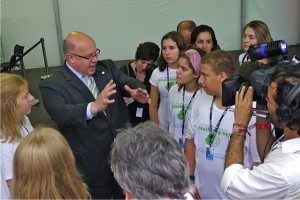
Peter Altmaier and the Youthinkgreen crowd at the Rio+20 summit.
Handshake with a Minister
After the presentation, Ahmed even gets a chance to meet the German Environment Minister Peter Altmaier. Together with his friends from the Youthinkgreen crew, the young man has managed to sneak into Hall 4 – a restricted area and normally reserved for state and United Nations delegates only. But Ahmed keeps his cool and steps up right next to Altmaier: „We have come to bind a green bracelet to your wrist!“ Ahmed and his friends hope that through this little gesture the politician will be reminded of young people’s longing for a greener future.
Altmaier who just turned 54 two days before, laughs heartily and stresses how important it is that young people take action. The Minister takes his time, listens patiently to everything the youngsters tell him. “Please visit Egypt and help us to put up more solar panels.“ Before the journalists can push in to fire their questions at the Minister, Ahmed has grabbed the opportunity to speak up again. Altmaier says that he wishes all the best for Egypt but that he unfortunately can not be in every country at the same time but will remember this meeting. Then he turns around to talk into the television cameras.
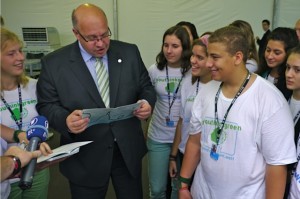
At the Rio+20 congress, teenagers from Youthinkgreen handed over green bracelets and a position paper to politicians and scientists from around the world.
“The only living thing that can be seen from the moon”
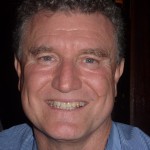
Don Henry, Australian Conservation Foundation
Interview: Kerstin Schnatz
The Australian Conservation Foundation (ACF) is Australia’s main environment group. With the United Nation’s Earth Summit starting this Wednesday, Global Ideas reporter Kerstin Schnatz spoke to ACF’s executive director Don Henry in Rio de Janeiro. The conference is also known as Rio+20 as it marks the anniversary of the first Earth Summit twenty years ago. Over one hundred world leaders are in Rio to seek answers to global challenges such as climate change or marine pollution.
Global Ideas: If there was one thing you were free to write into the Rio+20 final paper what would it be?
Don Henry: I think there is a very straightforward issue at the moment and that is cutting subsidies for fossil fuels around the world. In Australia, we have subsidies worth billions of dollars that go into making fossil fuels cheaper for the mining industry.
But I would love to also ensure there is much stronger investment into renewable energy and energy efficiency around the world. I’d really like to see the international financial institutions like the World Bank and the International Monetary Fund (IMF) cut any loan programms to the fossil fuel sector and really boost loan portfolios to renewables and efficiency.

Activists at the Rio+20 summit protesting against fossil fuel subsidies
What impacts of climate change do you feel in Australia?
In recent years, we have had some terrible bushfires that have killed a lot of people in extreme, hot weather that has never been seen before in Australia. If the world doesn’t act, our best scientists are saying we are going to get double the amount of droughts and they will be twice as severe over the next 20-30 years. That will also have a big impact on food production in Australia.
And another example, something that is dear to my heart: We are very privileged in Australia that we are the custodians of the Great Barrier Reef, the largest reef system on earth and the only living thing on the planet that can be seen from the moon. The Great Barrier Reef is at grave risk from climate change. The best science out there is saying if global average warming goes beyond two degrees, we will see a severe impact on the reef. It would be a tragedy if our generation allowed one of the great global treasures, the Great Barrier Reef, not to be handed on in good condition to our children.
What is the most important goal Australians have achieved in the last twelve months to tackle climate change?
We’ve had a very big effort from Australian civil society to put a price on carbon emissions. Our government last November passed legislation for a carbon trade scheme. The legislation is complemented by a ten-billion dollar investment into clean energy and a carbon farming initiative that rewards farmers for tree planting and for holding on to forest areas. That’s been an important step forward for us as a nation.
At a side event at Rio+20, nuclear power was promoted as a sustainable way of producing energy. What’s the perception of nuclear power in Australia?
When you look at whether nuclear power is a solution for climate change in Australia, most Australians would say the risk associated with accidents and long lived nuclear waste is not a solution to action on climate change.
Apart from that, Australia is lucky because we receive twice the amount of solar energy per square meter than Germany does. So we have huge potential for renewable energies. We also have extensive gas reserves – which is still a problem with emissions, but gas plants still have less emissions than coal. So I think most Australians feel we don’t have to go there and we shouldn’t.
Australia may not have any commercial nuclear power plants. But the country has a strong mining industry exporting uranium for nuclear power plants around the world.
ACF strongly opposes uranium mining. Because often the mines have been imposed on Aboriginal people, on Aboriginal land without their full consent.
There are also real problems with safety for workers at the mines. For instance one of the mines in the Northern Territory, the Ranger uranium mine, has got a legacy of hundreds of accidents that have affected workers’ health.

Indiginous land owner Yvonne Margarula in front of the Ranger uranium mine. The mining site is surrounded by world heritage listed Kakadu National Park.
And then there is another huge problem: What do you do with the radioactive waste from the mining process itself? For example, a condition of mining operations is they have to make safe the waste ponds for ten thousand years. Human beings are not good at making things safe for one hundred years, much less ten thousand years.
And of course many Australians are very worried with what happens with uranium from Australia overseas. We do know for example, it was Australian uranium in the Fukushima reactors. So in an indirect way, Australia has contributed to the problems associated with the accidents.
What are you expecting to come out of Rio+20?
We are very worried that it will be quite a modest outcome at a time when environmental degradation and sustainability issues are so urgent and pressing globally.
Pictures: Global Ideas/ Dominic O’Brien




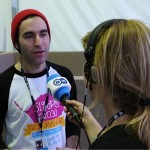
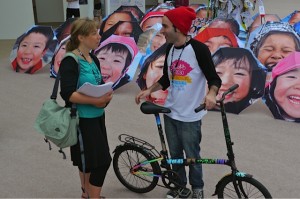
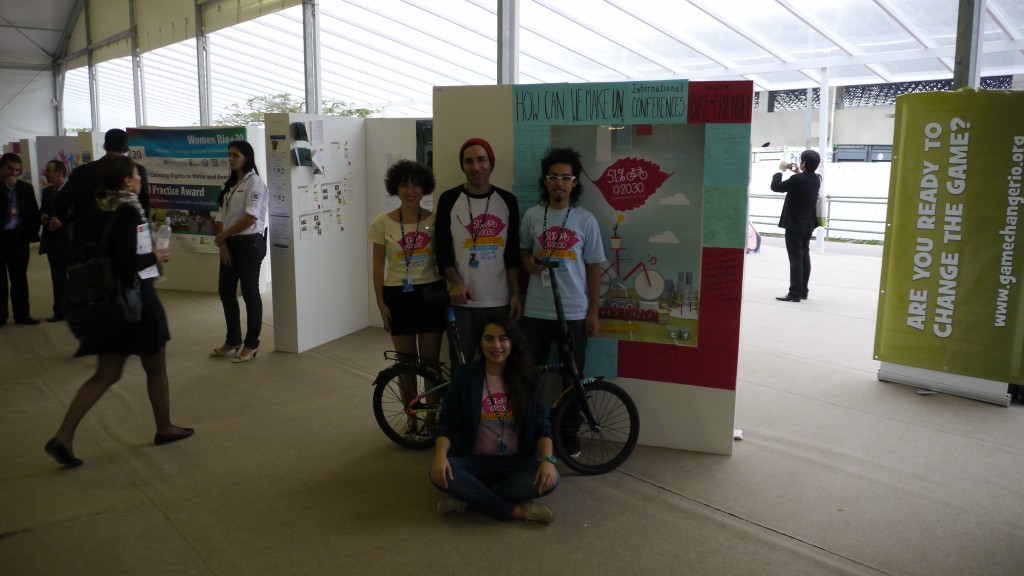
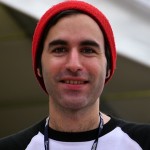




Feedback